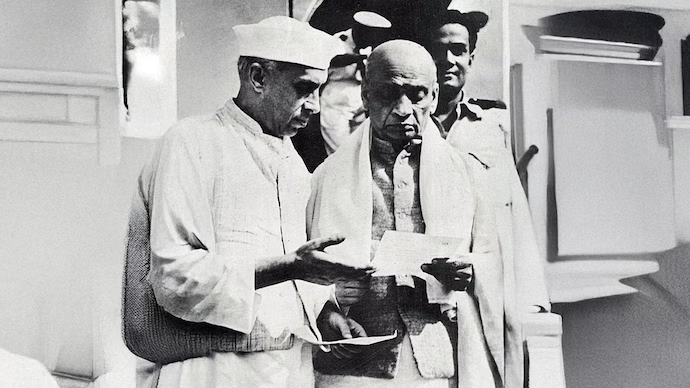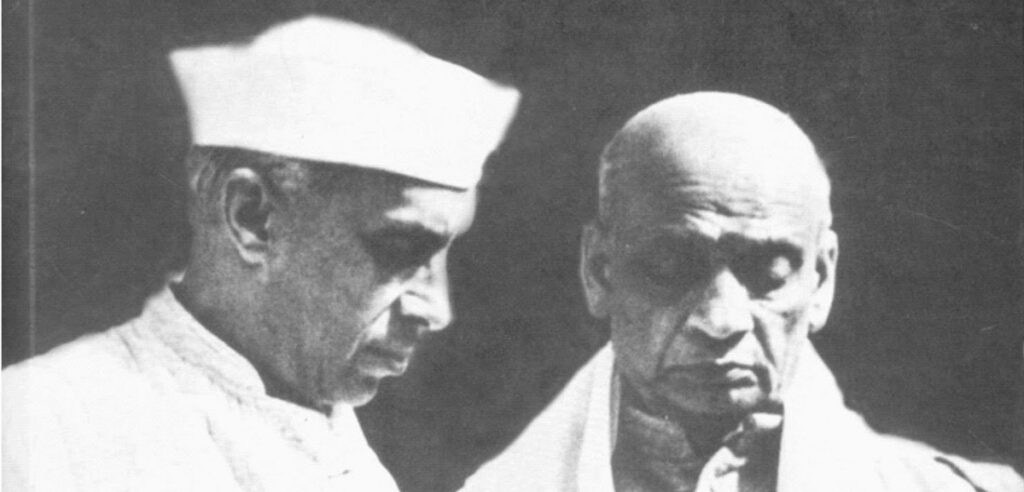
In the labyrinth of Indian political history, the question of Pakistan-occupied Kashmir (PoK) has remained one of the most contentious and debated topics. The intricacies surrounding its loss from Indian territory have often led to polarized views, with two of India’s most influential leaders of the time, Jawaharlal Nehru and Sardar Vallabhbhai Patel, at the center of the debate. Who bore the responsibility for PoK slipping out of India’s hands? To understand this, we must delve into the historical, political, and strategic milieu of the time.
The Historical Context: Post-Partition Turmoil
The seeds of the Kashmir issue were sown in 1947 when India gained independence from British rule, and the subcontinent was partitioned into two nations, India and Pakistan. The princely states, which were semi-autonomous regions under British suzerainty, were given the choice to join either India or Pakistan or remain independent. Among these was Jammu and Kashmir, a state with a predominantly Muslim population but a Hindu ruler, Maharaja Hari Singh. His indecision on whether to accede to India or Pakistan set the stage for conflict.
In October 1947, tribal militias supported by Pakistan invaded Jammu and Kashmir, prompting Maharaja Hari Singh to seek India’s military assistance. He signed the Instrument of Accession, legally integrating Kashmir into India. However, the conflict escalated into a full-fledged war between India and Pakistan. The outcome of this war and the decisions taken during its course led to the creation of PoK, a region that remains under Pakistan’s control.
This was not just a territorial conflict but a manifestation of the ideological differences between the two newly formed nations. Pakistan sought to position itself as the protector of Muslim-majority regions, while India emphasized its secular ethos, which allowed for a multi-religious and multi-ethnic society. The loss of PoK became a significant challenge for India in asserting its vision of a united and inclusive nation.
Nehru’s Leadership: Decisions and Criticisms
Jawaharlal Nehru, India’s first Prime Minister, has often been criticized for his handling of the Kashmir issue. Nehru’s decision to take the matter to the United Nations in January 1948 has been a focal point of criticism. At the UN, a ceasefire was brokered, leading to the establishment of the Line of Control (LoC). Critics argue that this move internationalized the Kashmir issue, giving Pakistan a foothold to perpetuate its claims over the region.
Nehru’s idealism and belief in diplomacy are often contrasted with the pragmatic approach that might have been required to consolidate Indian control over the entire region. His vision of a secular India and commitment to democracy influenced his approach to Kashmir, a Muslim-majority region. Nehru’s detractors claim that his personal connection to Kashmir, being of Kashmiri descent, might have clouded his judgment.
Furthermore, Nehru’s emphasis on international mediation through the United Nations was seen as a strategic error by many. The involvement of third-party actors not only complicated the resolution of the conflict but also provided Pakistan with a platform to present its claims. This international dimension added layers of complexity that persist even today.
Despite the criticisms, Nehru’s supporters argue that his decisions were guided by the larger vision of maintaining peace in the subcontinent. His actions reflected a deep commitment to democratic principles, which included respecting the aspirations of the Kashmiri people. The decision to promise a plebiscite, although never realized, was in line with his belief in self-determination.
Patel’s Role: Pragmatism and the Integration of States
Sardar Vallabhbhai Patel, India’s first Deputy Prime Minister and Home Minister, played a pivotal role in integrating over 500 princely states into the Indian Union. His approach to statecraft was marked by pragmatism and decisive action. Many argue that if Patel had been given a free hand in handling Kashmir, the outcome might have been different.
Patel’s correspondence and documented opinions reveal his initial reluctance to prioritize Kashmir, as he believed it was Nehru’s domain. However, he was unequivocally firm in his stance against Pakistan’s aggression. Patel’s supporters contend that his strategies for the swift and complete integration of other princely states demonstrate the efficiency that could have been extended to Kashmir.
The contrast between Nehru and Patel’s approaches is often highlighted to illustrate the missed opportunities in consolidating Kashmir’s integration into India. Patel’s focus on internal consolidation and his willingness to use force where necessary stood in stark contrast to Nehru’s preference for diplomatic solutions. This dichotomy in leadership styles has fueled debates on whether a more unified strategy could have altered the course of events.
The Role of International Dynamics
The geopolitical context of the late 1940s also played a crucial role in the Kashmir conflict. The Cold War era was beginning to take shape, and India’s decision to remain non-aligned influenced its diplomatic strategies. Pakistan, on the other hand, aligned itself with Western powers, particularly the United States, gaining military and financial aid.
The involvement of the United Nations further complicated the issue. The UN’s resolutions called for a plebiscite to determine Kashmir’s future, which was never conducted due to differing interpretations and unmet preconditions. This deadlock perpetuated the division of the region and left the LoC as a de facto border.
India’s position at the United Nations was further weakened by its non-aligned stance. While this policy aimed to maintain India’s sovereignty and independence in global affairs, it limited its ability to leverage international alliances. Pakistan’s strategic alliances with the West allowed it to garner support and resources, which were instrumental in fortifying its control over PoK.
Subheading: Consequences of the Partition of Kashmir
The partition of Kashmir into Indian-administered Jammu and Kashmir and PoK had far-reaching consequences. The demographic, cultural, and economic fabric of the region was deeply affected. For India, the loss of PoK was not just a territorial issue but a blow to its secular and pluralistic ethos. Pakistan’s control over PoK became a symbol of its narrative of supporting Muslim-majority regions.
The human cost of the conflict was immense. Thousands of lives were lost, and the displacement of communities created deep scars that persist to this day. The divided families and militarized borders have made Kashmir one of the most heavily contested regions in the world.
The socio-economic conditions in PoK under Pakistan’s administration have also been a matter of concern. Reports of political marginalization, lack of development, and human rights abuses have highlighted the challenges faced by the local population. These issues have further complicated the narrative around PoK and its integration with Pakistan.
The Nehru-Patel Dichotomy: A Balanced Perspective
While Nehru and Patel had differing approaches to governance and decision-making, it is essential to view their actions in the context of their time. Nehru’s emphasis on diplomacy and international engagement reflected his broader vision for India’s place in the world. Patel’s focus on internal consolidation and pragmatic statecraft was equally critical for India’s nascent nationhood.
Blaming either leader solely for the loss of PoK oversimplifies the complexities of the situation. The interplay of military, political, and international factors shaped the outcome, making it a shared responsibility of the leadership and circumstances.
The internal dynamics within the Indian leadership also played a role in shaping the outcomes. The differences in Nehru and Patel’s perspectives were reflective of broader debates within the Indian polity on how to balance idealism with pragmatism. These debates continue to influence India’s policies and strategies in addressing contemporary challenges.
Subheading: Lessons for Contemporary India
The Kashmir conflict remains unresolved, with PoK at the heart of Indo-Pak tensions. The historical lessons from the Nehru-Patel era underscore the need for a cohesive and strategic approach. For contemporary India, the priority lies in safeguarding its sovereignty, fostering regional stability, and addressing the aspirations of the Kashmiri people.
India’s current policies towards PoK and Jammu and Kashmir reflect a more assertive stance, with a focus on countering Pakistan’s propaganda and strengthening territorial integrity. Internationally, India’s growing clout as a major power offers opportunities to present its narrative effectively.
The emphasis on infrastructure development, counter-insurgency measures, and diplomatic efforts to isolate Pakistan on the global stage are key components of India’s strategy. These initiatives aim to reinforce India’s position and address the historical grievances associated with the Kashmir issue.
Subheading: The Human Element in the Conflict
Beyond the geopolitical and strategic dimensions, the Kashmir conflict has profoundly impacted the lives of the people in the region. The loss of PoK and the subsequent militarization of the region have disrupted lives, fractured communities, and created an enduring sense of insecurity.
The aspirations of the Kashmiri people, both within Indian-administered Jammu and Kashmir and PoK, remain central to resolving the conflict. Addressing these aspirations requires a multi-faceted approach that includes political engagement, economic development, and cultural integration. The voices of the people, often marginalized in the larger narrative, must be amplified to ensure a just and lasting solution.
Conclusion: Revisiting the Past, Shaping the Future
The loss of PoK is a chapter in Indian history that continues to evoke intense debate. Nehru and Patel, as towering figures of their time, made decisions within the constraints and challenges they faced. Understanding their actions requires a nuanced perspective that transcends simplistic blame games.
As India charts its path forward, the legacy of PoK serves as a reminder of the complexities of statecraft and the enduring importance of unity, vision, and strategic foresight. The story of Nehru, Patel, and Kashmir is not just about the past; it is a guidepost for addressing the challenges of the future.
By engaging with history critically and constructively, India can draw lessons that strengthen its resolve and enhance its ability to navigate the complexities of the modern world. The Kashmir conflict, while deeply rooted in the past, remains a contemporary challenge that demands innovative solutions and unwavering commitment.

